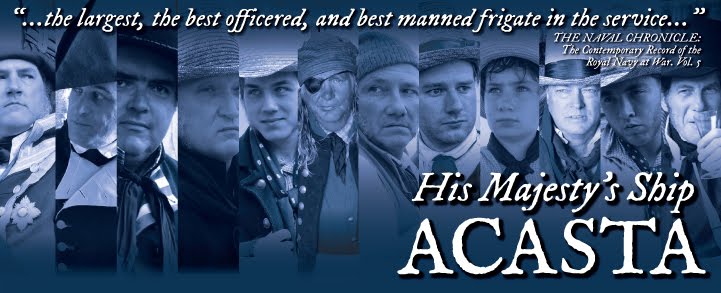 On the 8th of March the Constitution, having in company, along with her two prizes, a merchant brig of which she intended to make a cartel, anchored off the isle of Mayo, one of the Cape de Verds ; and on the next day got under way, and anchored, a few hours afterwards, in the harbour of Porto-Praya, island of Saint-Jago. While on his way to these islands, Captain Stewart had caused the Cyane to be painted so as to resemble a 36-gun frigate. The object of this was to aggrandize his exploit, in the wondering eyes of the gaping citizens of Boston ; not one in a hundred of whom, he knew, would trouble themselves to inquire any further on the subject. The American captain would doubtless have played of the same deceptio visûs upon the Levant, had he not been aware, that no efforts of the painter could make a low flush ship of 464 tons resemble a frigate. On the 11th, at 15 minutes past noon, just as Captain Stewart had sent his master to bring the cartel brig under the stern of the Constitution, in order that the prisoners might be removed to her, three strange a ships were discovered through the haze, standing into the harbour. These were the British 50-gun ships Leander and Newcastle, Captains Sir George Ralph Collier, K. C. B. and Lord George Stuart, and 18-pounder 40-gun frigate Acasta, Captain Alexander Robert Kerr. We will now step back for a moment, and endeavour to show what had brought these three ships to a spot so distant from the station on which they had hitherto been cruising, the north-eastern coast of the United States.
On the 8th of March the Constitution, having in company, along with her two prizes, a merchant brig of which she intended to make a cartel, anchored off the isle of Mayo, one of the Cape de Verds ; and on the next day got under way, and anchored, a few hours afterwards, in the harbour of Porto-Praya, island of Saint-Jago. While on his way to these islands, Captain Stewart had caused the Cyane to be painted so as to resemble a 36-gun frigate. The object of this was to aggrandize his exploit, in the wondering eyes of the gaping citizens of Boston ; not one in a hundred of whom, he knew, would trouble themselves to inquire any further on the subject. The American captain would doubtless have played of the same deceptio visûs upon the Levant, had he not been aware, that no efforts of the painter could make a low flush ship of 464 tons resemble a frigate. On the 11th, at 15 minutes past noon, just as Captain Stewart had sent his master to bring the cartel brig under the stern of the Constitution, in order that the prisoners might be removed to her, three strange a ships were discovered through the haze, standing into the harbour. These were the British 50-gun ships Leander and Newcastle, Captains Sir George Ralph Collier, K. C. B. and Lord George Stuart, and 18-pounder 40-gun frigate Acasta, Captain Alexander Robert Kerr. We will now step back for a moment, and endeavour to show what had brought these three ships to a spot so distant from the station on which they had hitherto been cruising, the north-eastern coast of the United States.On the 19th of December the Leander sailed from Halifax bound off Boston, and on the 24th fell in with the Newcastle and Acasta. By their captains, it appears, Sir George was informed, that the Constitution had sailed from Boston, and the Congress from Portsmouth, New-Hampshire, and that the President was to join those ships " from the Delaware." Unfortunately, although it had been stated over and over again in the Halifax papers, neither of the three captains appears to have been aware, that the Congress had, some months before, been dismantled and laid up at Portsmouth, and that the President was not lying in the " Delaware, " but in New York. On turning to the Newcastle's log, to see who it was that had been playing off such a hoax on Lord George, we find that, on the 22d, while the Newcastle and Acasta were lying at anchor in Cape Cod bay, the 18-gun brig-sloop Arab, Captain, Henry Jane, joined company, "with intelligence that the Constitution had sailed from Boston on the 17th instant." Not another word is there. This, however, was quite enough to hasten the two ships in getting under way, and to make their captains wish. no doubt, that they had kept under way in front of the port which they had been ordered to watch.
This story about the sailing of the American squadron, whether derived, in the first instance, from fishermen, cattle-dealers, or any other of the cunning New-England folk, was credited by Sir George Collier ; and away went the Leander, Newcastle, and Acasta, in search of the Constitution and the "two other heavy frigates" that had sailed "in her company." the 4th of January, when off the Western Isles, the three ships fell in with a brig-prize belonging to the American privateer Perry; and, having chased under American colours, were taken for an American squadron. The consequence was, that the prize-master of the brig voluntarily came on board the Leander, and pretended to take that ship for the President, the Newcastle for the Constitution, and the Acasta, not for the Congress, but for the Macedonian. In short, the fellow would have said or sworn anything, that he thought would ingratiate himself with his hearers. Mr. Marshall says, "Nothing could have happened better" than this farcical interview with the American privateer's-man. On the contrary, looking to the serious impression it appears to have made onboard the Leander, we should rather say, nothing could have happened worse.
To be continued...
Excerpt from "Naval history of Great Britain - Vol. VI" by William James


No comments:
Post a Comment